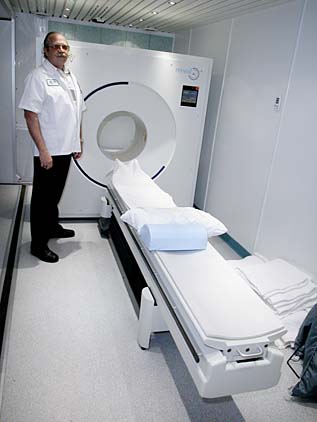
CRAIG T. KOJIMA / CKOJIMA@STARBULLETIN.COM
The Positron Emission Tomography scanner is used to scan people for all kinds of cancer. D. "Rick" Rickenbacher, chief technologist and operations manager, stands next to the machine.
PET scans offer a clearer
view into the bodyThe test is done at two Oahu
facilities and detects disease
Janice Johnson credits her "new beginning" to the latest imaging technology used to detect cancer.
A fist-size lump in Johnson's breast was diagnosed as cancer in June last year, and she underwent a mastectomy. A CAT scan, which uses computers to produce a three-dimensional image from flat X-rays, also showed something on her liver, and after further examinations she turned to a Positron Emission Tomography scanner to find out what it was.
PET is a camera that detects biochemical changes after a small amount of radioactive glucose is injected into the body. Malignant cancers usually consume more glucose, and the difference in biological functions is measured and converted into images.
The PET scan has 85 percent to 95 percent diagnostic accuracy, according to the Journal of Nuclear Medicine.
With pre-approval from the Hawaii Medical Service Association in October for insurance coverage, Johnson went to a mobile unit operated by Hawaii P.E.T. Imaging.
The facility began operation in July last year at St. Francis Medical Center-West in Ewa, Wednesday through Friday, and St. Francis-Liliha on Mondays and Tuesdays.
"It told me I didn't have cancer in my body anywhere," Johnson said.
But in a follow-up examination this year, a CAT scan again showed something on her liver, she said. "I cried. I thought, Here we go, it's been a year, and breast cancer comes back a lot."
She went back for another PET scan Aug. 25, becoming one of the first patients to use a new state-of-the-art imaging system in the mobile unit.
"It can see through your bones; it's amazing," she said. "The new one is faster and more comfortable, too, because you have to lay still. ... It told me I didn't have cancer still. ... I feel really confident now, having had the new PET scan and seeing how accurate it is, that I do not have cancer."
Eric Hannum, Hawaii P.E.T. Imaging marketing director, said the new scanner "is light-years away" from the previous scanner, with five times better resolution.
All organ systems can be imaged in one examination, and certain cardiac and neurological conditions, including Alzheimer's disease, also can be diagnosed with the detector.
Dr. Marc Coel, chief of the Queen's Medical Center's Nuclear Medicine Department, is medical director for the mobile PET. He reads images for that facility and the HamamatsuQueen's PET scanner.
He said the new scanner is excellent, but both facilities "are equivalent in the final result."
Scanning time has been reduced to 40 minutes from about 1 1/2 hours with the new technology and is expected to be reduced further, said Cynthia Okinaka, president of the imaging company.
A feature of the new system will allow doctors to access the Hawaii P.E.T. Imaging Web site to see their patients' images, she said.
"It's a very nice solution to some logistics we have in getting reports and images back to doctors in a timely way," Okinaka said.
When the mobile unit began operation last year, it had 11 patients the first month, she said. By last month it had 75 patients.
Insurance coverage for PET scans is gradually increasing, she said, noting Medicare's approval in October to use the scans for breast cancer and this year for thyroid cancer.
HMSA covers PET screening for conditions, such as lung, colorectal and lymphoma cancers, and requires pre-authorization for breast, thyroid, ovarian and other cancers, Okinaka said.
He said HMSA "could in good conscience and good business practices eliminate many of the pre-certifications" and prevent delays.
HMSA restricts PET scans to one a year, and sometimes patients treated for cancers need to be checked for persistent or recurrent disease, he said.
People want to be checked to see if they have cancer, or they are depressed and want to have their brain examined, he said. "We probably get one call a week on something like that, and we don't do them," Coel said.
He said people without a medical reason for a PET scan can pay the $2,700 cost.
Hawaii P.E.T. Imaging started a program with the American Cancer Society to aid imaging for neighbor island residents such as Johnson, who lives on Kauai.
The service picks patients up at the airport and takes them to the mobile unit.
With her worries about cancer eased, Johnson looks forward to eliminating another health problem Sept. 29 at Straub Clinic & Hospital.
She said her doctor, Laura Weldon Hoque, at Kapiolani Medical Center for Women & Children has referred her for gastric bypass surgery to shed some of her 290 pounds.
"I'm really looking forward to a brand-new beginning at 51," Johnson said.
For more information about PET imaging, see www.hawaii-pet.com or call 254-8488.
